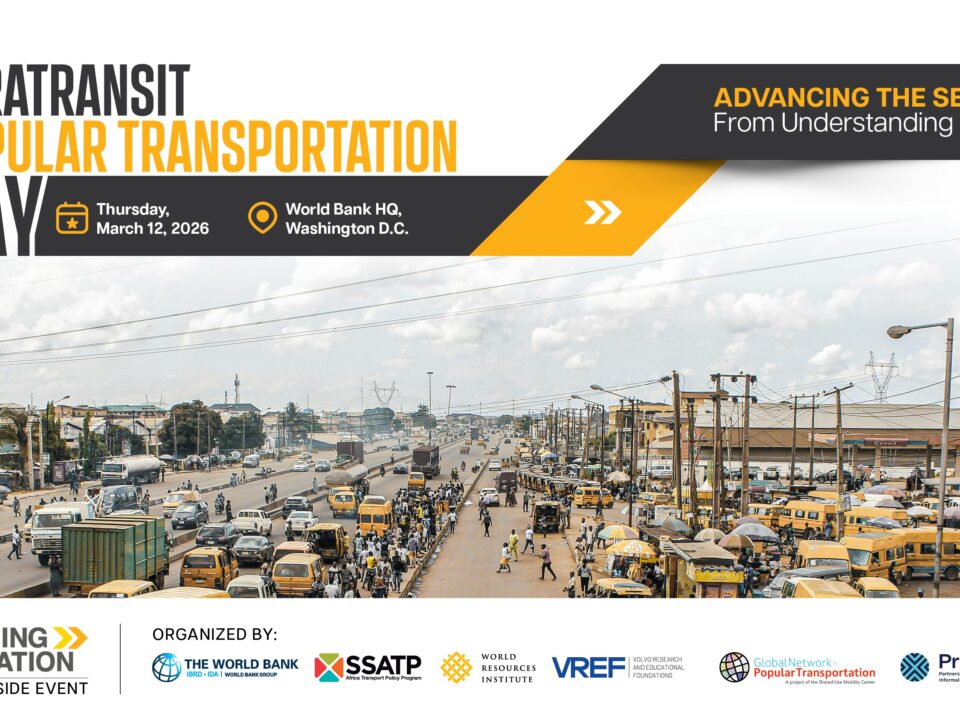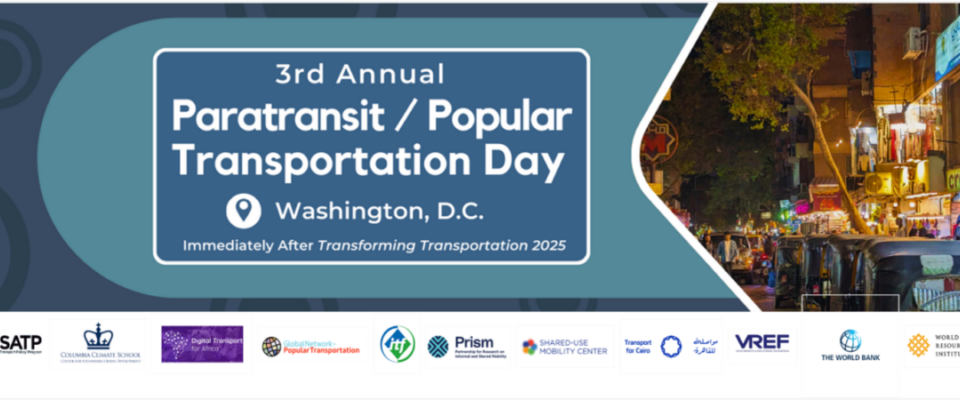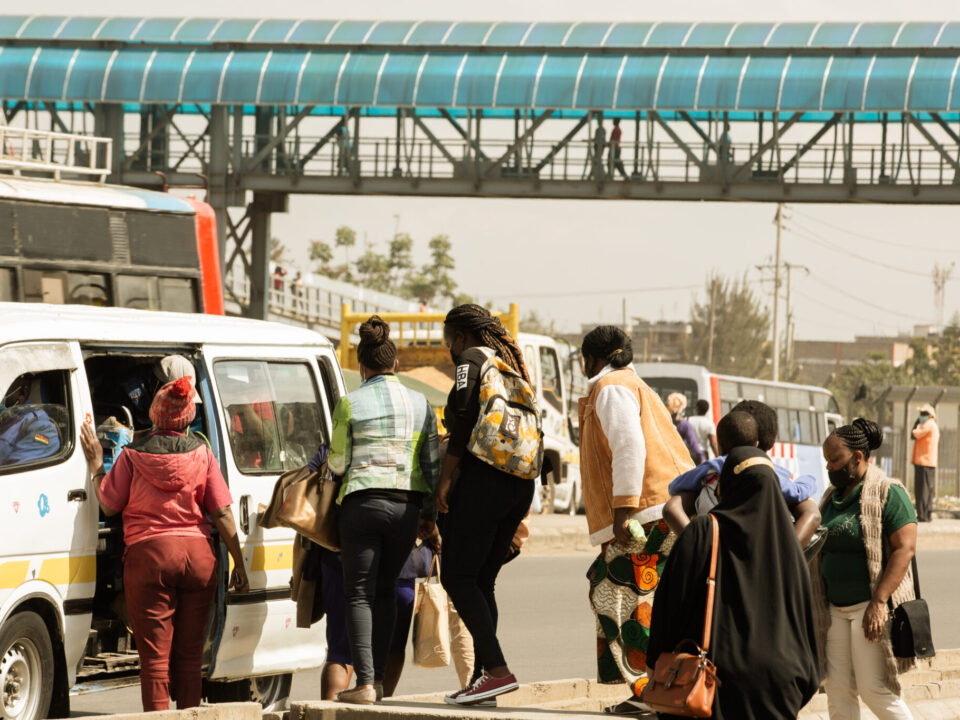
DigitalTransport4Africa (DT4A) Webinar Series: Measuring SDG 11.2 in African Cities – Challenges, Opportunities, and Policy Implications
13 April 2023
DigitalTransport4Africa (DT4A) Webinar Series: Introducing the TUMI Mobility Data Hub
19 May 2023Welcome to the April edition of DT4A Newsletter. Find out what’s new at DT4A and in the digital transport ecosystem and much more. Enjoy the read!
Stay tuned for more via the DT4A webinar series, newsletter, and @WRIAfrica and @WRIRossCities.
DT4A Repository Received GTFS Datasets from Kigali and Kinshasa
The urban transport mapping for resilience projects conducted in two cities, Kigali and Kinshasa, was funded by the Global Facility for Disaster Reduction and Recovery (GFDRR) and the World Bank, with the aim to collect data in both “dry” and “flooded” conditions to develop an understanding of accessibility to jobs and other opportunities during the dry and wet seasons. The data was collected by GoMetro to map and record the public transport network in Kigali and Kinshasa, both under dry and rainy conditions. The GTFS datasets for Kigali, Kinshasa and other cities are available on the DT4A GitLab repository. A huge thanks to Paolo Avner and his team for sharing the datasets with the DT4A team. We believe that researchers and urban planners can use this data to improve the efficiency and resilience of public transport systems in Kigali and Kinshasa.
Paratransit Gets Attention at Transforming Transportation 2023

A panel convened by the Transport GP and the Africa Transport Policy Program (SSATP) on leveraging paratransit professionalization to decarbonize transport in developing countries.
Transforming Transportation, organized by the World Bank and WRI Ross Center for Sustainable Cities, took place on March 14th to 15th in Washington, DC. The event brought together high-level policy makers, cutting-edge thinkers and community change agents to explore solutions that accelerate the path towards green and inclusive mobility for all. Speakers discussed topics including decarbonization of transport, inclusive mobility, resilient transport, accelerating innovation, climate finance, and beyond.
Experts such as Sergio Oliete Josa from the Africa Transport Policy Program (SSATP), Dr. Jaqueline M. Klopp from Columbia University, Iman Abubaker from World Resources Institute (WRI) Africa, Nangamso Matebese from the Development Bank of Southern Africa (DBSA), Amanda Ngabirano from the Kampala Paratransit Consultative Forum (KPCF) spoke in the session. “Leveraging Paratransit Professionalization to Decarbonize Transport in Developing Countries“, focused on innovative solutions to decarbonize transport, particularly within Africa.
Dr. Jaqueline M. Klopp, Director of the Center for Sustainable Urban Development at Columbia University’s Climate School, highlighted the importance of leveraging collaborative data collection to engage paratransit in transforming transportation in African cities in an age of climate change. She explained that we have a global transport equity problem, and that the Global North contributes more to global emissions while the Global South is likely to suffer more from impacts, including impacts on transport systems. Iman Abubaker, Urban Mobility Project Manager at WRI Africa, emphasized the importance of connecting informal transport to climate action. She explained that more than 90% of public transport trips in African cities are made by semi-informal or informal transport services, which fills a major gap due to lack of investment in public transport infrastructure. She added that informal transport is demand-responsive and adaptive, but not necessarily safe or efficient. However, this sector is often overlooked in climate change agendas such as National Determined Contributions (NDCs).
Let’s build on this discussion together! By investing in an equitable transition towards low-carbon and recognizing the untapped potential of paratransit or popular transport systems to address climate change across African cities through emissions inventories, improved informal transport services and electrification.
DT4A at Paratransit Day: A Transforming Transportation 2023 Side Event
On the sidelines of Transforming Transportation 2023, SSATP, the World Bank, DBSA, WRI and Agence Française de Développement (AFD) – through the DigitalTransport4Africa (DT4A) initiative, Volvo Research and Educational Foundations (VREF), the Global Network for Popular Transportation (GNPT) and the Shared-Use Mobility Center (SUMC) – joined forces to organize a “Paratransit Day” on March 16th, 2023 to share knowledge and initiatives around paratransit improvement.
The DT4A workshop shared insights from Africa on data, digitalization and public transport. The workshop highlighted ideas and lessons learned from the DT4A initiative, shared knowledge and exchanged perspectives on what is possible for successful implementation of digital transport projects, explored possible scalable models that can be easily adapted by cities across Africa, discussed possible strategies to support grassroots transport mapping projects and shared opportunities for involvement and interest in funding.
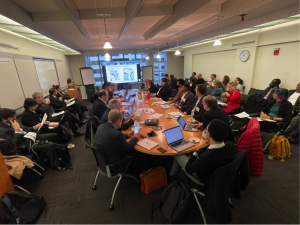
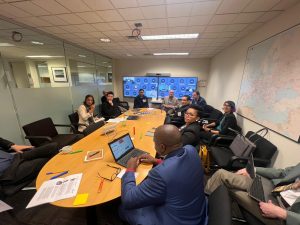
A hybrid workshop convened by WRI and AFD on data, digitization and public transport.
Throughout discussions between speakers and participants, it was highlighted that to improve paratransit services, it is essential to have data and metrics (including on routes, trips and emissions) to understand baselines, trends and progress. City-level capacity building, tool deployment and data management are crucial. However, maintaining adequate financing for such initiatives is a challenge, as is maintaining related data and documents. Despite these difficulties, there is a robust volunteer community to build upon, although more structure, organization and compensation are needed. Improving communication and storytelling by using additional platforms such as TikTok and YouTube can help engage younger generations in open transit data sources. Moreover, engagement with multilateral and bilateral development banks, tech companies and other stakeholders is vital. These collective efforts can contribute to a broader strategy to address the challenges facing the African transport sector and promote sustainable development in the region.
DT4A Webinar Series
The DT4A Webinar Series is a monthly webinar organized by WRI and consortium partners to facilitate knowledge exchange around public transport and data initiatives in African cities and beyond.
Public Transport and Accessibility in Kisumu – Towards Sustainable Urban Mobility in Kenya | April 5, 2023
This session focused on Kisumu, Kenya, where residents face significant challenges due to inadequate transport facilities and services, and explored how the city adopted the Kisumu Sustainable Mobility Plan (KSMP) to address this issue. Gabriel Gitau from Institute for Transportation and Development Policy (ITDP) presented the survey conducted and developed a public transport service plan, assessing three potential scenarios for improving the city’s transport system by focusing on improving accessibility by prioritizing walking, cycling and public transportation.
Measuring SDG 11.2 in African Cities – Challenges, Opportunities and Policy Implications | April 26, 2023 | 9 – 10am EDT | 4 – 5pm EAT
This webinar will focus on Sustainable Development Goal (SDG) 11.2, which is defined as the proportion of an urban area with convenient access to public transport by sex, age and persons with disabilities. The goal aims to monitor the use and accessibility of public transport systems and reduce reliance on private transportation. During the webinar, the authors will explain the steps involved in measuring SDG 11.2, including defining city boundaries and collecting and creating data on public transport stops. They will also address the specific challenges and opportunities of measuring this goal in African cities, where paratransit is common and has no fixed routes or stops. The webinar will provide technical insights into measuring SDG 11.2 and conclude with policy implications.
Speakers: Stefanie Holzwarth and Dennis Mwaniki from UN-Habitat and Lewis Dijkstra from the European Commission.
Please follow this link for registration.
Join Us: If you are interested in presenting your work at one of our webinars, please fill out one of the webinar timeslots: DT4A Webinar Series. Your presentation should be directly related to digitalization, mapping and innovative public transport projects in African cities. The presentation should have African representatives as well as gender balance.
DT4A Innovation Challenge
DT4A launched the DT4A Innovation Challenge in December 2021 to spotlight and award innovative urban mobility mapping initiatives. The first four winners of the DT4A Innovation Challenge were chosen in June 2022 from more than 100 submissions. AddisMap (Ethiopia), Ewarren (Côte d’Ivoire), GoMetro (South Africa) and KhartouMap (Sudan) are now in the midst of a 12-month implementation period and telling their stories of impact across Africa.
Check out what our innovation winners are up to, in their own words:
AddisMap: “AddisMap is currently finalizing and validating the Anbessa and Sheger Buses data uploading to OpenStreetMap (OSM) which will later be extracted to GTFS for the trip planner app. We already have 90% of Anbessa and Sheger Bus Routes uploaded to OSM during the past month and conducted a successful sample testing on integrating the Minibuses to AddisMapTransit App. Hence, based on our findings we will continuously add the remaining minibus routes and turn the system fully multi-modal. Additionally, AddisMap will host a one-day brainstorming and in-depth discussion workshop to give insight into our project and current status to Addis Ababa Transport Bureau (AATB) and other relevant stakeholders.” – Alazar Tekle, GIS Expert, AddisMap
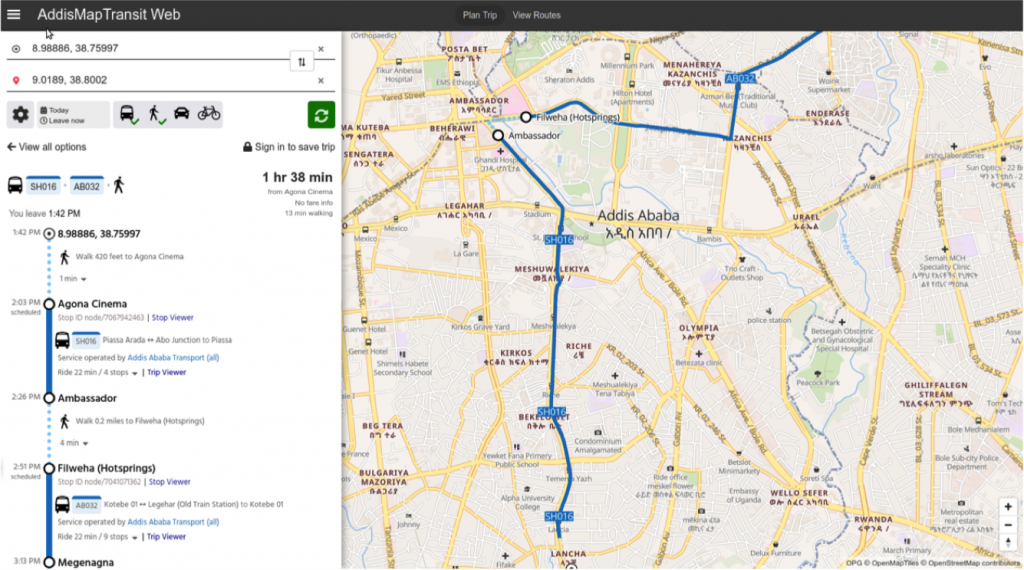
AddisMapTransit trip planner app for Addis Ababa city transit network (to be released to the public soon).
Ewarren: “To provide an accurate mapping around informal transport network that meet public transport authorities’ standards, Ewarren team held an initial meeting with Greater Abidjan Mobility Authority (AMUGA) to discuss the preliminary classification of routes and stops. Ewarren team recently met the Japan International Cooperation Agency (JICA) team to present the process performed to realize the mapping around the informal transport network and shared with them our vision of a sustainable mobility ecosystem and how the mapping is an essential part of this vision. These mapping efforts will be presented during mobility week in Abidjan in June 2023 in collaboration with AMUGA and JICA.” – Karamoko Camara, CEO & Founder, Ewarren
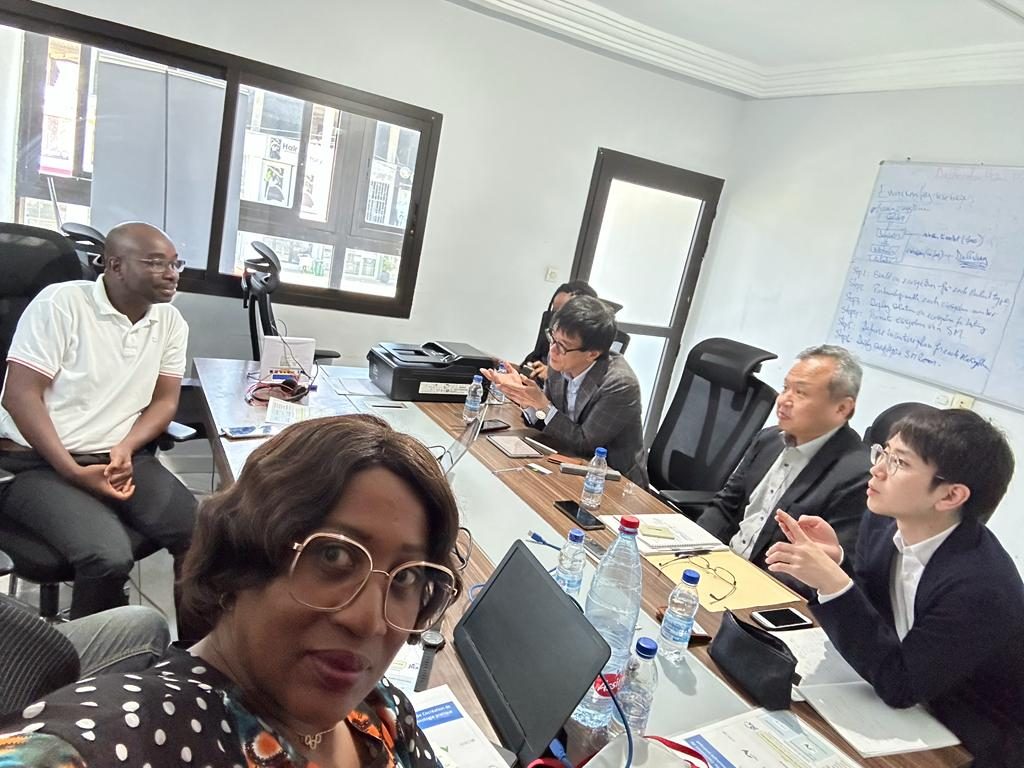
Ewarren team presenting the current mapping efforts of informal transport network and their vision to JICA team.
GoMetro: “GoMetro has successfully completed its data collection programme through finalizing the on-board data collection phase. In this phase GoMetro tracked 10 minibus taxis for 3 days each, by using local data collectors (Enumerators) and the GoMetro Pro application. This data is currently being cleaned and analyzed and will provide insights on daily revenue earned per vehicle, and the ridership demographic of commuters.” – Rudi Kriel, Transport Economist, GoMetro
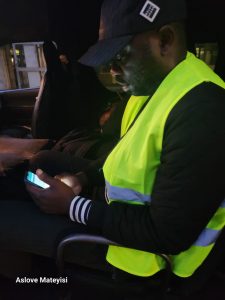
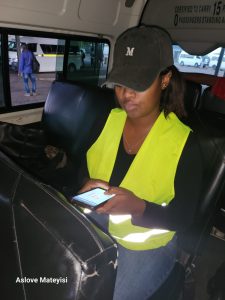
Ongoing data collection by the GoMetro team in the Stellenbosch municipality.
KhartouMap: “As the KhartouMap team wraps up their mapping efforts after covering over 400 bus routes, their efforts have shifted to conducting an extensive mobility survey with over 6,500 collected responses to date. The survey is being in conducted three streams to ensure covering different demographic groups: online through social media, in major bus terminals and markets, and within neighborhoods.” – Awad Abdelhalim, Co-Director, KhartouMap
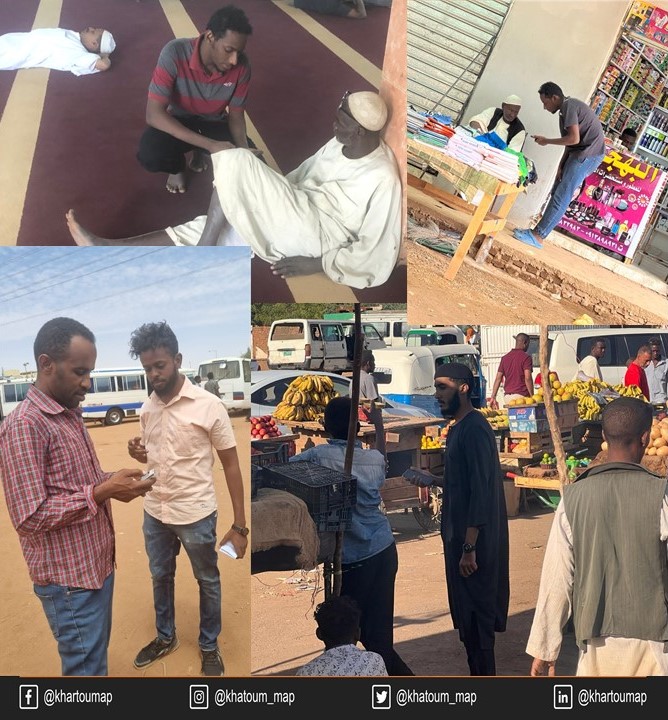
Ongoing mobility survey by the KhartouMap team in Greater Khartoum.
Partners Corner
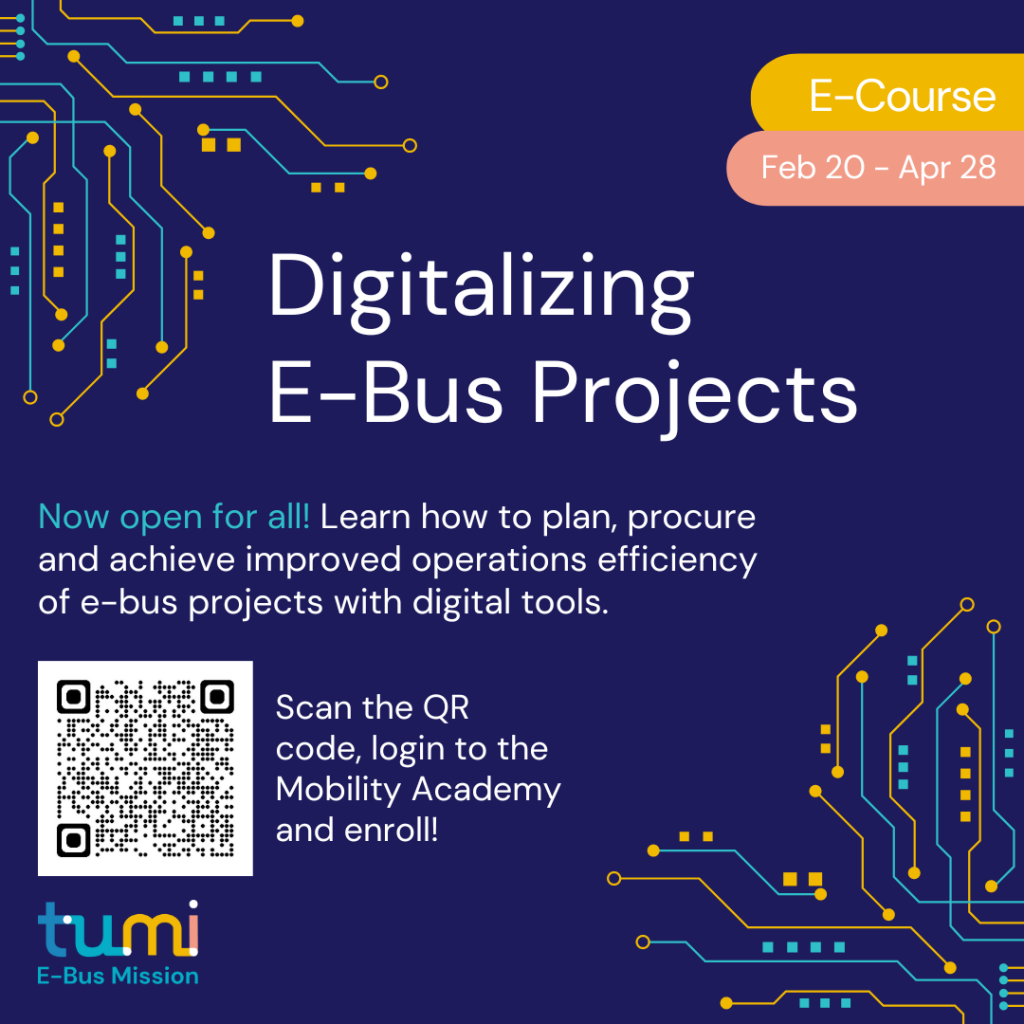
Join the Digitizing E-Bus Projects Course by TUMI
This online course offers public transport utilities and practitioners detailed information on how to implement future ready e-bus projects with the latest digitation tools and services. It adopts a specific focus on the use of digital tools at three different stages of e-bus projects: planning and procurement, operations monitoring and management and project performance evaluation. It also considers the data sharing challenges that transit agencies experience with the operators and aims to provide potential approaches to deal with them.
Broad Learning Topics:
- Tooling up for digitalization of public transport
- Transition planning, battery and charging strategies
- Scheduling: Efficient block building
- Enabling Operations: Dispatching smartly charged buses
- Keeping range under control, managing day-to-day operations
- Project Evaluation: Improving operations using technical insights
The course is divided into 6 modules and will organize 3 Virtual Study Tours to share some good practice examples! The course is supported in 3 languages (EN, ES, PT) and also includes a certification. Enrollment link.
Upcoming! If you would like to be featured in our next newsletter, please contact us at esthelyne.dusabe@wri.org or info@digitaltransport4africa.org.
The DigitalTransport4Africa (DT4A) initiative, led by WRI and partners and funded by the French Development Agency (AfD), is a digital data commons community that supports improved public transport and access in Africa. We promote open, standardized data, open-source tools, ethical data stewardship and peer-to-peer sharing.
